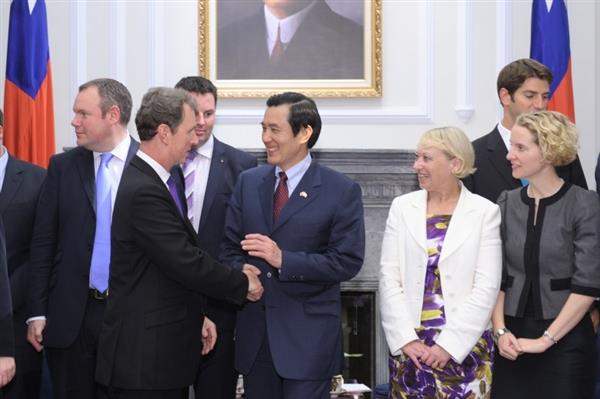News & activities
 News releases
News releases
President Ma Ying-jeou met on the afternoon of June 2 with a delegation of parliamentarians from the United Kingdom, extending a cordial welcome to the visitors on behalf of the government and people of the ROC. The president also expressed his desire for stronger trade and economic ties between the two nations.
The president remarked that bilateral ties go back a long way, noting in particular that the move by the UK in 2009 to grant visa-free status to ROC nationals brought significant changes to the relationship. In that year, the number of tourists from Taiwan to the UK rose 150% from 2008, while the volume of bilateral trade in 2010 was up 25% over the previous year. Following in the UK's footsteps in granting visa-free status to ROC nationals was the European Union, which adopted the same policy toward people from Taiwan starting in January of this year. This has brought the number of jurisdictions that provide visa-free courtesies or landing visas to Taiwan nationals to an all-time high of 114, compared with 53 when he took office in May 2008. In addition, British Foreign Secretary William Hague in May of this year delivered a report to Parliament in which he unveiled a plan for diplomatic resources to be increasingly devoted to nations that maintain substantive trade relations beneficial to the UK. In addition, the plan called for stationing more diplomatic personnel to 18 countries, one of which was the ROC. The president said he was extremely pleased to see this development.
President Ma also remarked that Taiwan took part for the second time this past May in the RHS Chelsea Flower Show , where Taiwan orchids were used to decorate a booth into an image of the royal couple's church wedding. The Taiwan booth was selected from over 650 entries for a gold medal. The booth conveyed the good wishes of the people of Taiwan for the British royal family, and symbolized the importance placed on the bilateral relationship.
President Ma then pointed out that UK Trade & Investment and the British Foreign Office in May of this year released "Britain open for business –UKTI's five year strategy" and a seven-point "Charter for Business," which demonstrates the British government's intention to foster trade and economic cooperation with other countries, and in particular with emerging economies. President Ma enthusiastically welcomed this move, pointing out that since the cross-strait Economic Cooperation Framework Agreement entered into effect earlier this year, Taiwan's trade with mainland China and other nations has grown significantly. He expressed his hope that this new situation will lead to increased opportunities for bilateral cooperation and open up new doors between Taiwan and the UK. At the same time, the president also called on the European Union to further explore the possibility of signing Trade Enhancement Measures with Taiwan.
The delegation, led by Nigel Evans, Deputy Speaker of the House of Commons, was accompanied to the Presidential Office by Vice Minister of Foreign Affairs Ssu-Tsun Shen (沈斯淳) and David Campbell, Director of the British Trade and Cultural Office in Taiwan, to meet President Ma. Also attending the meeting was National Security Council Deputy Secretary-General Chih-kung Liu (劉志攻).



